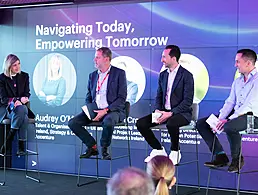Research from talent solutions company Robert Walters shows that young employees are abdicating middle management positions to focus on personal growth and skills.
No generation is a copy of the one that came before it. While they will share certain characteristics and life experiences, there can be a wide disparity in thinking and behaviour when it comes to the different generations sharing a workspace.
For example, Generation X and millennials entered into the workforce during a time in which societal change meant more women were encouraged to embark upon careers. Similarly, young adults from the era of the baby boomers and today’s Gen Z workers were and are spurred on by shifting political and social sands. As much like the situation today, the ’60s and ’70s were rocked by mass political and social revolution.
Talent solutions company Robert Walters surveyed 2,000 people based in the UK across a wide range of industries, including HR and finance and made the discovery that employees in the Gen Z category are more likely to engage in ‘conscious unbossing’ than previous generations. That is to say, they don’t aspire to middle management positions and tend to focus their attention on personal development and the accumulation of skills instead.
More than half (52pc) of Gen Z respondents stated that they have no desire to hold middle management roles, with 69pc believing that the role comes with a great deal of stress and yields low reward. Tension has grown in recent years between older generations in the workplace and their younger counterparts, with some baby boomer staff members criticising Gen Z employees for a perceived lack of work ethic and disregard for traditional frameworks.
Gen Z employees on the other hand have been critical of what they see to be an unwavering and outdated loyalty to older working methods and an inability to adapt to the new technologies transforming the workplace. Both schools of thought are likely exaggerated and rooted in generational stereotyping, however, evidence would suggest that digitalisation is, in part, responsible for a rise in ‘conscious unbossing’.
Change is trendy
Speaking to Business Insider, Vistage CRO Joe Galvin indicated that ‘conscious unbossing’ is neither new, nor solely a result of changing attitudes among a younger workforce. Rather, factors affecting millennials, for example middle management roles being made obsolete and the pandemic-related change to working life, have trickled down to affect Gen Z employees.
The survey would certainly suggest that Gen Z employees are a generation that views company dynamics as less important to long-term success, as despite 89pc of responding employers stating that middle managers play a crucial role in the running of an organisation, nearly a third of Gen Z employees (30pc) would opt for a flat structure over a hierarchical one.
For Lucy Bisset, the director of Robert Walters North, it is clear that the road towards middle management is not a universally held aspiration among the younger age groups in the workforce. “More senior professionals have usually committed years to one company, working their way through more traditional levels of management and as such have developed a greater respect for mid-level managers,” she said.
“Younger professionals, having entered the workforce in a largely remote or hybrid capacity with a huge focus on digital capabilities, are less inclined towards complete company loyalty.”
Individual success
Described by Bisset as a group that have an inherent entrepreneurial mindset, Gen Z employees are often said to be brand builders, who work independently to cultivate their own approach, rather than spend time managing others and their projects.
Little reward, high levels of stress, reduced personal growth and limited decision-making powers, were cited as some of the reasons Gen Z survey respondents would elect to avoid middle management positions in their careers, with 36pc stating they understand they might have to accept a mid-level position at some point and 16pc remaining adamant that it is not an option for them.
Certainly, there is evidence to suggest that, as we move into the fourth industrial revolution, the world of work will be subject once again to mass upheaval. Jobs may disappear, new ones will be created and Gen Z will be surpassed by Gen Alpha as the newest generation to join the workforce.
Suffice to say, Gen Z’s commitment to self-development in a working world that is heavily reliant on upskilling and reskilling, could stand to them. Before too long they will be the ones writing articles about how the younger generations are transforming working hierarchies, structures and expectations.
Don’t miss out on the knowledge you need to succeed. Sign up for the Daily Brief, Silicon Republic’s digest of need-to-know sci-tech news.




